Legal Technical Assistance Activities by the International Cooperation Department ~Contributing to the world is Japan’s strength!~
Part 1 What is legal technical assistance?
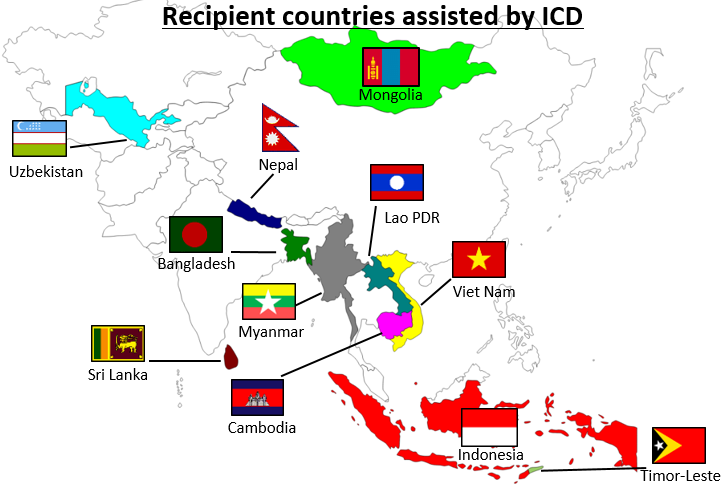 |
Main legal technical assisatance ・1994 Vietnam Cooperation started ・1996 Cambodia Cooperation started ・1998 Laos Cooperation started ・1998 Indonesia Cooperation started ・2001 International Cooperation Department established ・2001 Moved to Osaka Nakanoshima National Government Office Building ・2001 Uzbekistan Cooperation started ・2007 China Cooperation started → 2021 finished ・2008 Timor-Leste Cooperation started ・2008 Central Asia Cooperation started ・2009 Nepal Cooperation started ・2013 Myanmar Cooperation started ・2016 Bangladesh Cooperation started ・2017 Moved to the International Justice Center ・2019 Sri Lanka Cooperation started |
Three basic pillars of legal technical assistance
Legal technical assistance is aimed at the development and improvement of legal systems which are being created in developing countries and in those which are transitioning to market economies.
These are the three basic pillars:
(1) Assistance in drafting of basic laws and regulations
(2) Assistance in development of systems for judicial institutions that enforce enacted laws and regulations
(3) Assistance in development of human resources such as legal practitioners
Part 2 Activities of the International Cooperation Department
1. Recent activities
After receiving requests from developing countries in Asia, the Research and Training Institute, in cooperation with the Ministry of Foreign Affairs and the Japan International Cooperation Agency (JICA), etc., have been supporting the development of good governance and market economies in the countries from which the requests came, as well as promoting assistance focusing on development of laws and regulations and their reliable implementation to become the foundation of development in such countries.
Such assistance belongs to the framework of technical assistance among the official development assistance (ODA) projects and has been increasingly attracting attention as “face-to-face support”, while the International Cooperation Department has been constantly developing and expanding such assistance practices.
The activities carried out by the International Cooperation Department are roughly divided into the following five groups:
(1) Training in Japan
(2) Dispatch of lecturers to local seminars
(3) Activities in working groups (advisory groups) in Japan
(4) Dispatch of advisor-type experts into the field
(5) Other activities
The contents of these activities are introduced below.
(1) Training in Japan
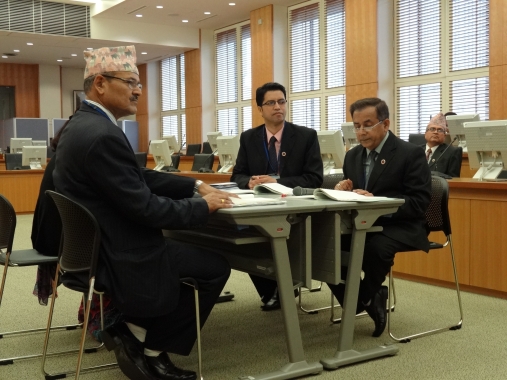 We invite legislators, judges, prosecutors, lawyers, etc. from the target countries to Japan for training in various programs.
We invite legislators, judges, prosecutors, lawyers, etc. from the target countries to Japan for training in various programs.
In these trainings, through programs such as introduction of the Japanese legal system in a lecture format, presentation by the trainees from each country on specific subjects (country reports), discussions among the trainees, and tours of judicial institutions, we deepen mutual understanding about the basic principles of law, the history of the development of the legal system in Japan, the current situation with the mechanism and implementation of the Japanese legal system, the actual situation and problems of legal systems in the target countries, etc., and examine the measures to be taken in the future.
Training programs are held at the International Justice Center in Akishima city where the International Cooperation Department is located, the Research and Training Institute in Kasumigaseki, Tokyo, and the JICA Tokyo International Center.
(2) Dispatch of lecturers to local seminars
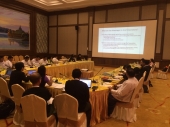 The International Cooperation Department dispatches instructors as JICA seminar lecturers to various seminars dedicated to laws and regulations and their implementation held in the target countries.
The International Cooperation Department dispatches instructors as JICA seminar lecturers to various seminars dedicated to laws and regulations and their implementation held in the target countries.
Many of the topics covered at such local seminars are urgent, such as legislative and legal amendments expected in target countries in the near future, and lectures and discussions are carried out for legislators from relevant government agencies, etc.
In local seminars
・large numbers of people can participate at the same time
・dispatched instructors can learn the latest facts about the target country and can directly observe local practices
(3) Activities in working groups (advisory groups) in Japan
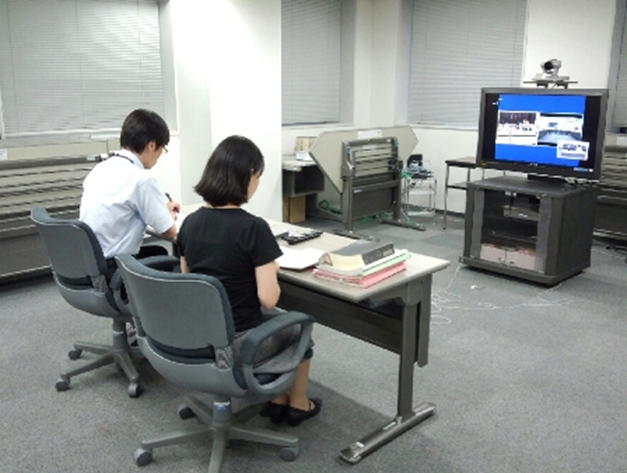 As a member of the working group (advisory group) made up of Japanese university professors and legal practitioners and aimed at assistance on drafting of bills, the International Cooperation Department gives advice related to drafting of bills and other issues to representatives from the target countries.
As a member of the working group (advisory group) made up of Japanese university professors and legal practitioners and aimed at assistance on drafting of bills, the International Cooperation Department gives advice related to drafting of bills and other issues to representatives from the target countries.
(4) Dispatch of expert advisors
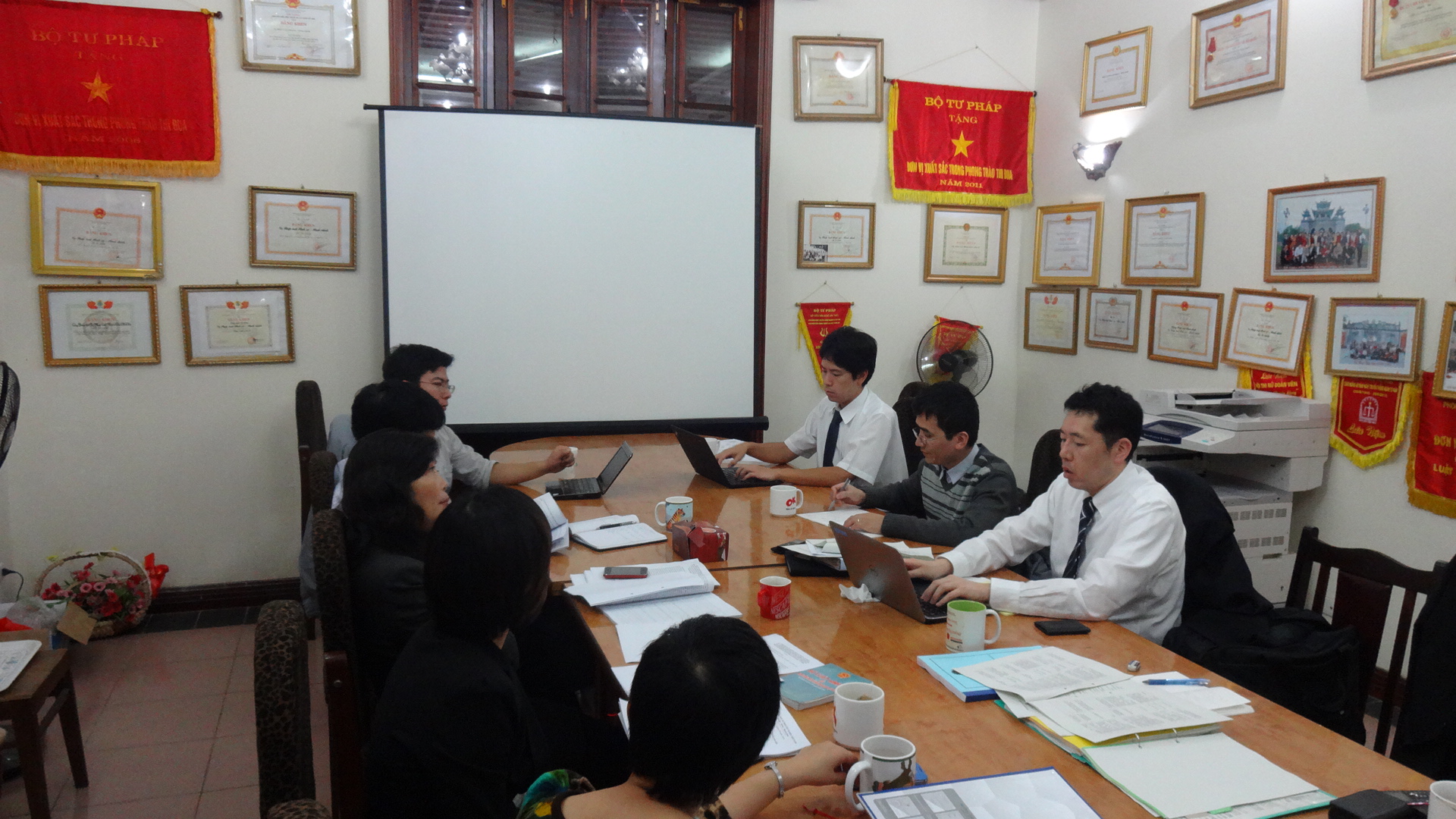 The Research and Training Institute cooperates with the Supreme Court and sends one prosecutor to Vietnam, two prosecutors to Cambodia (one of them, an experienced judge), one prosecutor to Laos and two prosecutors to Indonesia (one of them, an experienced judge) as long-term JICA experts who stay on site for one year or more.
The Research and Training Institute cooperates with the Supreme Court and sends one prosecutor to Vietnam, two prosecutors to Cambodia (one of them, an experienced judge), one prosecutor to Laos and two prosecutors to Indonesia (one of them, an experienced judge) as long-term JICA experts who stay on site for one year or more.
These long-term experts research the countries' legal systems, give advice to judicial professionals, plan and prepare necessary assistance and develop interaction and coordination with relevant organizations for the organization of local seminars, etc.
Additionally, in order to investigate legal systems of target countries, instructors from the International Cooperation Department may be dispatched as short-term experts for periods from several weeks to several months.
(5) Other activities
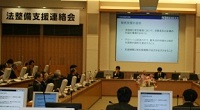 The International Cooperation Department holds international symposia and conducts research activities.
The International Cooperation Department holds international symposia and conducts research activities.
So far, in addition to holding several symposia during country-specific trainings and regional trainings, we also hold symposia on corporate law by inviting experts from the Asia-Pacific region and symposia for university students as well as for law school graduate students, young lawyers and scholars whose tasks will be to provide legal technical assistance in the future.
In addition, we are conducting the Japan-Korea partnership joint research. In this joint research, the Japanese Ministry of Justice, the Supreme Court and the staff from Korean courts exchange opinions and conduct research on registries, deposits, family registers and civil execution.
2. Cooperating agencies
The International Cooperation Department works closely with relevant ministries and agencies including the Ministry of Foreign Affairs, JICA, and the International Civil and Commercial Law Centre (ICCLC).
The ICCLC was established in April 1996 with cooperation from the business world, academia and the legal community to assist the development of legal systems in the field of civil and commercial law and is one of our strong partners.
In addition, we enjoy the cooperation of organizations such as universities mainly in the cities of Tokyo, Osaka and Nagoya.
In the future, there is a need to further strengthen our assistance opportunities by means of all-Japan cooperation.
After receiving requests from developing countries in Asia, the Research and Training Institute, in cooperation with the Ministry of Foreign Affairs and the Japan International Cooperation Agency (JICA), etc., have been supporting the development of good governance and market economies in the countries from which the requests came, as well as promoting assistance focusing on development of laws and regulations and their reliable implementation to become the foundation of development in such countries.
Such assistance belongs to the framework of technical assistance among the official development assistance (ODA) projects and has been increasingly attracting attention as “face-to-face support”, while the International Cooperation Department has been constantly developing and expanding such assistance practices.
The activities carried out by the International Cooperation Department are roughly divided into the following five groups:
(1) Training in Japan
(2) Dispatch of lecturers to local seminars
(3) Activities in working groups (advisory groups) in Japan
(4) Dispatch of advisor-type experts into the field
(5) Other activities
The contents of these activities are introduced below.
(1) Training in Japan
 We invite legislators, judges, prosecutors, lawyers, etc. from the target countries to Japan for training in various programs.
We invite legislators, judges, prosecutors, lawyers, etc. from the target countries to Japan for training in various programs.In these trainings, through programs such as introduction of the Japanese legal system in a lecture format, presentation by the trainees from each country on specific subjects (country reports), discussions among the trainees, and tours of judicial institutions, we deepen mutual understanding about the basic principles of law, the history of the development of the legal system in Japan, the current situation with the mechanism and implementation of the Japanese legal system, the actual situation and problems of legal systems in the target countries, etc., and examine the measures to be taken in the future.
Training programs are held at the International Justice Center in Akishima city where the International Cooperation Department is located, the Research and Training Institute in Kasumigaseki, Tokyo, and the JICA Tokyo International Center.
(2) Dispatch of lecturers to local seminars
 The International Cooperation Department dispatches instructors as JICA seminar lecturers to various seminars dedicated to laws and regulations and their implementation held in the target countries.
The International Cooperation Department dispatches instructors as JICA seminar lecturers to various seminars dedicated to laws and regulations and their implementation held in the target countries.Many of the topics covered at such local seminars are urgent, such as legislative and legal amendments expected in target countries in the near future, and lectures and discussions are carried out for legislators from relevant government agencies, etc.
In local seminars
・large numbers of people can participate at the same time
・dispatched instructors can learn the latest facts about the target country and can directly observe local practices
(3) Activities in working groups (advisory groups) in Japan
 As a member of the working group (advisory group) made up of Japanese university professors and legal practitioners and aimed at assistance on drafting of bills, the International Cooperation Department gives advice related to drafting of bills and other issues to representatives from the target countries.
As a member of the working group (advisory group) made up of Japanese university professors and legal practitioners and aimed at assistance on drafting of bills, the International Cooperation Department gives advice related to drafting of bills and other issues to representatives from the target countries.(4) Dispatch of expert advisors
These long-term experts research the countries' legal systems, give advice to judicial professionals, plan and prepare necessary assistance and develop interaction and coordination with relevant organizations for the organization of local seminars, etc.
Additionally, in order to investigate legal systems of target countries, instructors from the International Cooperation Department may be dispatched as short-term experts for periods from several weeks to several months.
(5) Other activities
 The International Cooperation Department holds international symposia and conducts research activities.
The International Cooperation Department holds international symposia and conducts research activities.So far, in addition to holding several symposia during country-specific trainings and regional trainings, we also hold symposia on corporate law by inviting experts from the Asia-Pacific region and symposia for university students as well as for law school graduate students, young lawyers and scholars whose tasks will be to provide legal technical assistance in the future.
In addition, we are conducting the Japan-Korea partnership joint research. In this joint research, the Japanese Ministry of Justice, the Supreme Court and the staff from Korean courts exchange opinions and conduct research on registries, deposits, family registers and civil execution.
2. Cooperating agencies
The International Cooperation Department works closely with relevant ministries and agencies including the Ministry of Foreign Affairs, JICA, and the International Civil and Commercial Law Centre (ICCLC).
The ICCLC was established in April 1996 with cooperation from the business world, academia and the legal community to assist the development of legal systems in the field of civil and commercial law and is one of our strong partners.
In addition, we enjoy the cooperation of organizations such as universities mainly in the cities of Tokyo, Osaka and Nagoya.
In the future, there is a need to further strengthen our assistance opportunities by means of all-Japan cooperation.
Part 3 Why is legal technical assistance necessary?
1. It is people who operate legal systems
"Legal system" refers to a legal structure which consists of various laws with a constitution at the top, as well as to an entire system which allows for its practical implementation.
Legal systems serve the purpose of defining basic rules for a society and realizing the rights and obligations of its people along with carrying an important function of resolving conflicts and preserving public order by punishing offenders.
However, for that to actually function, not only people involved in disputes but also various people related to legal systems must actively participate.
2. Legal systems are common assets shared with other countries
In modern society, developments in transportation and communications technology have led to intensification of international relations, including economic transactions.
People, capital, products, information, etc. are moving around the world in large volumes every day, and in such a world, legal systems affect not only domestic affairs of one country but also of countries and people related to that country.
In countries which have inadequate and unreliable legal systems, industrial and economic development becomes difficult.
3. The history of modern legal system development in Japan
Until the middle of the 19th century, Japan had its own legal system which was influenced by Chinese culture.
However, starting from the Meiji Restoration, the country was forced to develop a modern legal system that would also be applicable in Europe and the United States, and it resorted to inviting legal experts from Europe and the United States, or to dispatching students to Europe and the United States to learn their systems; thus, Japan has the experience of creating a modern legal system which matches its society and culture.
In addition, the legal system also changes according to the changes in society, economy and culture.
There is no end to the development of legal systems and even the developed countries are also constantly improving their legal systems.
4. Situation in developing countries
On the other hand, there are many developing countries in the world in which modern legal systems have not been fully developed.
In particular, with the introduction of a market economy, the countries that have adopted centrally controlled planned economic policies are under pressure to fundamentally restructure their existing legal systems.
However, since developing countries do not have sufficient human and material resources, it is not easy for them to establish legal systems quickly and properly on their own.
Therefore, international organizations and developed countries must help in the development of the legal systems in developing countries.
5. Significance of Japan's legal technical assistance
Japan actively contributes to all aspects of the international community.
Japan has the following strengths in implementing legal technical assistance for developing countries:
・Legal culture different from that of developed Western countries
・Experience of researching and adopting elements of major legal systems (such as those of France, Germany, the United States, and the United Kingdom) for over 100 years
・Culture similar to that of other Asian countries
6. Characteristics of Assistance by Japan
Japan's practices of legal technical assistance have the following characteristics:
・Respect for the individuality and independence of the target country
Providing several options for legal system development and leaving it up to the target country
Conducting thorough surveys on the actual situation in target countries
・Activities from a medium- and long-term perspective
Legal technical assistance is not only about drafting of bills
Emphasizing the development of systems for law enforcement and implementation and training of human resources such as lawyers
"Legal system" refers to a legal structure which consists of various laws with a constitution at the top, as well as to an entire system which allows for its practical implementation.
Legal systems serve the purpose of defining basic rules for a society and realizing the rights and obligations of its people along with carrying an important function of resolving conflicts and preserving public order by punishing offenders.
However, for that to actually function, not only people involved in disputes but also various people related to legal systems must actively participate.
2. Legal systems are common assets shared with other countries
In modern society, developments in transportation and communications technology have led to intensification of international relations, including economic transactions.
People, capital, products, information, etc. are moving around the world in large volumes every day, and in such a world, legal systems affect not only domestic affairs of one country but also of countries and people related to that country.
In countries which have inadequate and unreliable legal systems, industrial and economic development becomes difficult.
3. The history of modern legal system development in Japan
Until the middle of the 19th century, Japan had its own legal system which was influenced by Chinese culture.
However, starting from the Meiji Restoration, the country was forced to develop a modern legal system that would also be applicable in Europe and the United States, and it resorted to inviting legal experts from Europe and the United States, or to dispatching students to Europe and the United States to learn their systems; thus, Japan has the experience of creating a modern legal system which matches its society and culture.
In addition, the legal system also changes according to the changes in society, economy and culture.
There is no end to the development of legal systems and even the developed countries are also constantly improving their legal systems.
4. Situation in developing countries
On the other hand, there are many developing countries in the world in which modern legal systems have not been fully developed.
In particular, with the introduction of a market economy, the countries that have adopted centrally controlled planned economic policies are under pressure to fundamentally restructure their existing legal systems.
However, since developing countries do not have sufficient human and material resources, it is not easy for them to establish legal systems quickly and properly on their own.
Therefore, international organizations and developed countries must help in the development of the legal systems in developing countries.
5. Significance of Japan's legal technical assistance
Japan actively contributes to all aspects of the international community.
Japan has the following strengths in implementing legal technical assistance for developing countries:
・Legal culture different from that of developed Western countries
・Experience of researching and adopting elements of major legal systems (such as those of France, Germany, the United States, and the United Kingdom) for over 100 years
・Culture similar to that of other Asian countries
6. Characteristics of Assistance by Japan
Japan's practices of legal technical assistance have the following characteristics:
・Respect for the individuality and independence of the target country
Providing several options for legal system development and leaving it up to the target country
Conducting thorough surveys on the actual situation in target countries
・Activities from a medium- and long-term perspective
Legal technical assistance is not only about drafting of bills
Emphasizing the development of systems for law enforcement and implementation and training of human resources such as lawyers
Part 4 Future outlook
International organizations such as the United Nations and the World Bank, as well as developed countries provide legal technical assistance in various parts of the world. Japan needs to cooperate with these organizations and countries to promote more efficient and effective legal technical assistance. While international economic activities are intensifying, the role Japan should play in the international community is becoming more important. In particular, the needs for development of legal systems in Asian countries are only increasing, and expectations and requests to Japan for legal technical assistance are constantly growing. In Japan, a revised version of the "Basic Policy on Legal Technical Assistance " (this link leads to the website of the Ministry of Foreign Affairs), which shows the view of the Japanese government on legal technical assistance, was issued in May 2013. In addition to confirming the original policy of strengthening all-Japan efforts related to public-private partnerships for technical assistance, the perspective of improving the investment environment for overseas expansion of Japanese companies was newly added, and eight countries such as Indonesia, Vietnam, Myanmar, Mongolia, Cambodia, Laos, Uzbekistan, and Bangladesh were listed as target countries for priority assistance.

